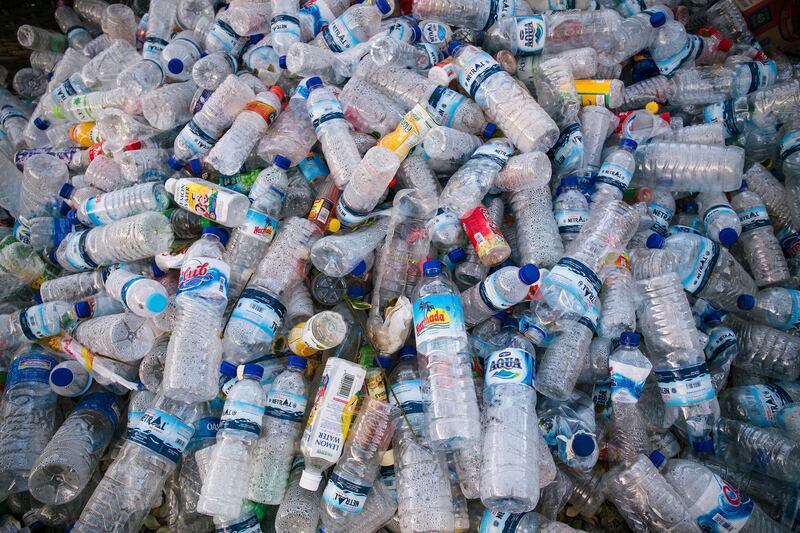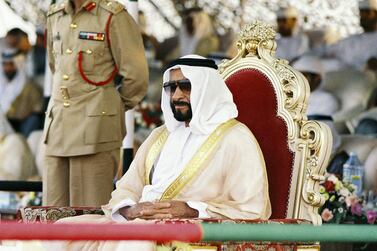With tables made from the wood of old abras and benches covered in non-chemically dyed camel leather, it is only natural that Baker & Spice would have an issue with single-use plastic bottles.
It has been five years since the popular Dubai chain of eateries began serving customers filtered water for free instead of bottled.
“Baker & Spice’s brand has always been very deeply connected to sustainability,” says Andre Gerschel, general manager.
While serving free tap water at restaurants and cafes is standard practice in many other parts of the world, it has not yet caught on the plastic-loving UAE. Increasingly, however, forward-thinking management at Dubai outlets, such as Baker & Spice, their new eatery Kizmet at Dubai Opera, Tom & Serg in Al Quoz, The Daily at Rove Healthcare City and Myocum in Dar Al Wasl Mall, are skipping the “still or sparkling” meal opener – and the standard-issue plastic bottle – and offering their customers free water instead.
Doing so reduces the impact of discarded plastic on the environment and takes into consideration the health of customers, diverting them from disruptive chemicals in plastic bottles that can leach into the water inside. It means restaurants can also skip the logistics and expense of ordering and storing all those bottles.
From a business perspective, it is understandable that owners and operators would fear a loss of revenue in water sales. But as those who have made the switch have found, it actually makes fiscal sense.
“The interesting thing is it actually ends up working in your favour,” says Mr Gerschel. “What ends up happening is that people spend more money on juice or coffee or they have an extra item. When they’re price-sensitive, a perceived discount encourages customer spending.”
Rami Farook is the Emirati artist and owner of the art cafe Maisan15 in Barsha South and General 3am in Al Serkal Avenue.
Both outlets serve free water, taken from five-gallon plastic bottles, to a young, hip, “health conscious and environmentally aware” crowd.
“We just thought it was a nice gesture of hospitality,” says Mr Farook. “And then of course there is the plastic issue.”
He is seeing fewer single-use plastic bottles on offer when he dines out around the city, something he calls less a trend and more a “responsibility”.
In keeping with its commitment to sourcing things locally, Baker & Spice also offers Al Ain in glass bottles at a premium, to encourage people to drink the free filtered water.
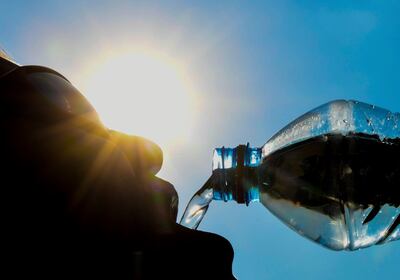
There was some resistance, says Mr Gerschel, from people who believed filtered water couldn’t be as good as what had been bottled.
“I’ve had these conversations with customers, despite the fact that the Ph balance and mineral content of the water is parallel to luxury waters like Voss," he says.
Baker & Spice uses filtration systems from Liquid of Life, a Dubai company now in its tenth year that has installed units in 1,500 residences and 120 offices and restaurants, including The Hundred Wellness Centre and The One Cafe. Demand is growing from both sides in restaurants, says Liquid of Life partner Rukhsana Kausar.
“I think consumers are demanding it and I think restaurants are more open to offering it,” she says.
Ms Kausar, who is well-acquainted with the doubts people have about UAE tap water, assures Liquid of Life’s independent testing has found that it meets World Health Organization standards. The company uses a patented carbon filter to remove impurities, metals or chemicals, mainly sediment and chlorine, while leaving the calcium, magnesium and potassium that has been added by the water authorities.
One thing people don’t realise about living in the UAE is how much filtered tap water they are already drinking, says Kausar. It comes from local water brands, who bottle and sell it, and cafes and restaurants who don’t publicise using it.
“People in the food and beverage industry are actually already serving filtered water,” she says. “It’s in their beverages, it’s in their teas and coffees and it’s in their ice.”
Tatiana Antonelli Abella, founder and managing director of the social enterprise Goumbook, believes free water at the table is about to become the norm in restaurants.
“People will always have an option to choose and ask for mineral water or bottled water,” she says. “But as a first welcome or first approach, more and more restaurants will give the filtered water.”
Awareness has grown and mindsets about the safety of tap water have changed significantly since Goumbook launched their Drop It campaign against single-use plastics in 2016.
“People are much more prepared,” says Ms Antonelli Abella. “You can put a jar of water in front of them and they would never complain and say ‘what is this’. I think even three years ago there would have been a backlash.”
When Jumeirah at Saadiyat Island Resort opened late last year as the first in the UAE to be plastic-free, it seemed to be a tipping point for the industry.
“I think everyone was waiting for the first hotel to take the lead and when Jumeirah announced that they were doing it, suddenly we received calls and emails from all the hotels,” says Antonelli Abella.
Trust Your Water, which launched 18 months ago and implemented the Jumeirah at Saadiyat filtration system, is now in talks with about 12 different hotel chains, said founder and owner Lorenzo Salin.
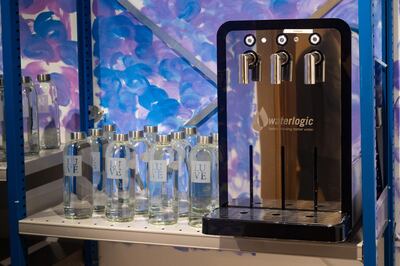
Not only is it the right thing to do for the environment, “it tends to also make also economic sense”, he says.
There are several compelling reasons for hotels to switch over now, he says. There is a reasonable return on investment, which for Trust Your Water systems is from 12 to 20 months. Studies have shown customers will pay more for a room if they know they are going to a sustainable hotel, while “plastic-free” has become a powerful marketing tool, he says.
Case in point is the attention paid to the Tryp by Wyndham Dubai, which just launched its own filtered water system, partnering with the local company No More Bottles.
It is estimated that by going to reusable glass, the hotel will save more than 306,000 plastic bottles from going into landfill every year, says general manager Jo-Ella Moore.
The hotel’s management wanted to get in front of the plastic issue before the focus turns to sustainability with Expo 2020, says Ms Moore.
“Dubai will be showcasing its commitment to the world in terms of reducing waste and CO2 emissions,” she says.
For now, Eda Gungor, who invested in an Enagic Kangen filtration machine for her Life’n One wellness centre and cafe in Jumeirah at the start of the year, sees the need to get rid of single-use plastic as “bigger than us”.
“It’s also going to come here eventually,” she says. “It’s a matter of education and a matter of time.”
Among the recent events to ditch plastic was the Emirates Literature Festival, which provided a "water house” for people to rehydrate from. It is estimated 15,000 fewer plastic bottles were used between March 1 and 9.
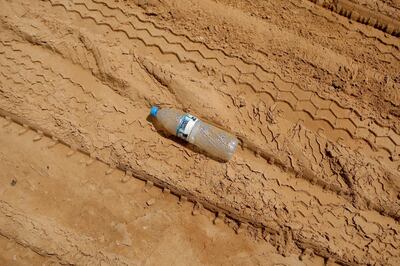
Reducing plastic in the office
Since launching their Drop It campaign in 2016, the social enterprise Goumbook has advised more than 50 offices in switching from single-use plastic to filtration systems and reusable bottles.
“Three years ago when we launched the plastic campaign we had to go and knock on doors and explain and try to convince people in any way we could that it was a good choice,” says Ms Abella, Goumbook’s founder and managing director. “Now we get the calls from the companies who want to do it.”
Their latest work was advising the new HSBC Middle East head office in DIFC, which added a filtration system and 3,000 branded glass bottles for staff. Local offices for UBS, DNO, AccorHotels and Etihad Airways are among the companies that have made the switch. Etihad, for example, reduced its carbon footprint by 51.5 tonnes of plastic water bottles last year.You end up saving a lot of money
A case study for Goumbook’s first project, with Omnicom Media Group, showed the company had been spending Dh108,000 per year on bottled water, often running out before the end of each month. The switch saved 960 five-gallon bottles and 181,000 of the 500ml bottles annually, while Omnicom broke even within eight months. Two years later, they expected to save 87 per cent on water costs, despite the cost of the filtration system maintenance.
Typically when procurement sees a return on investment in six to 12 months, says Antonelli Abella, it is a "no-brainer, they immediately sign off”.
“You end up saving a lot of money and that is why it is been very successful,” she says.
It is the staff, however, who usually take a bit more convincing.
“The hardest part is mindset within the employees,” she says. “Some of them don’t trust the water or they don’t understand why this is happening or they don’t know that bottled water is actually tap water, so they think they are going to drink unsafe water or not of good quality.”
